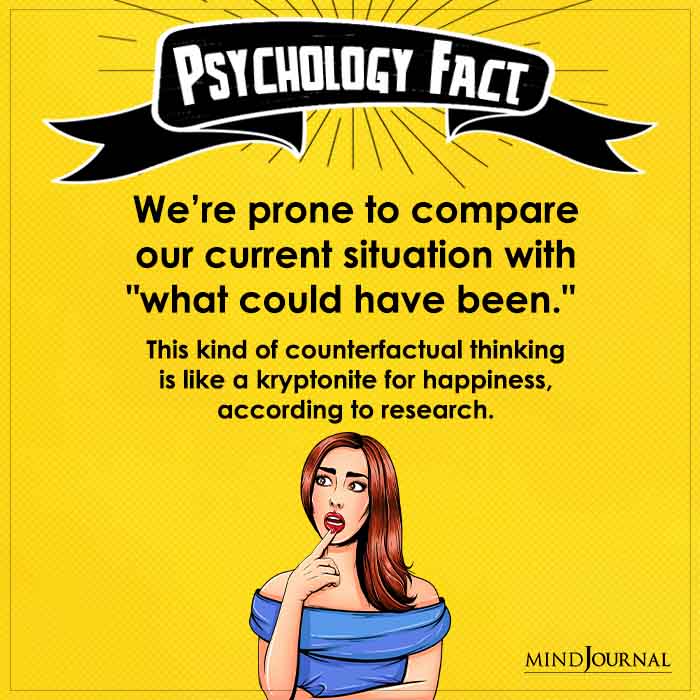Do you often find yourself lost in deep thoughts about what could have been? Imagining alternatives, different outcomes and reflecting about your choices? If so, then you’ve engaged in the cognitive process called counterfactual thinking. But what is counterfactual thinking?
It is a psychological exercise that enables us to think about and imagine multiple alternative realities, different decisions, and how our choices may impact us.
Let us explore more about counterfactual thinking psychology, examples of counterfactual thinking and types of counterfactual thinking and other aspects of counterfactual thought.
What is Counterfactual Thinking?
Counterfactual thinking involves mentally simulating alternative scenarios or outcomes that differ from what actually happened.

This means imagining “what if” situations and exploring how different choices or circumstances might lead to different results. It is like rewriting history mentally, where we can see how things would have been if something else had been changed.
Related: What Is Counterfactual Thinking: The Psychological Forces and Life-Altering Impact of ‘What Ifs
Understanding Counterfactual Thought
So what is counterfactual thinking? It is a kind of thinking that allows us to imagine different possibilities and consider how things could have turned out differently if some factors had been altered.
When people engage in counterfactual thinking they are creating “what if” situations in their minds and trying to figure out what would have happened if they made other choices or were in different circumstances.
Most often these imagined situations refer to the past, showing how various decisions could have resulted into today’s reality or even future situation.
Let’s take an example of someone who applied for a job but wasn’t given an opportunity. In this case, counterfactual thinking might involve reflections on what would have taken place if only he had performed better during an interview or possessed additional relevant experience.
They might think “If I had prepared more thoroughly, could I have impressed the interviewer enough for him/her to hire me?”
In this example, counterfactual thinking enables one to mentally explore alternative ways that he/she would have taken and evaluate the impact of different choices. By considering these “what if” questions, individuals might understand some of the factors that contributed to their job application outcome.
This kind of thinking helps people in reflecting about their actions and making better decisions next time.
However, counterfactual thinking is not limited to negative experiences or regrets; it can also be applied in positive situations too. For example, when someone gets promoted at work they might wonder how things would have been if they had done something differently.
They may ask themselves, “What if I hadn’t taken on that extra project? Would I still have been recognized for my performance?”
In this case, counterfactual thinking allows one to reflect upon what led to his/her accomplishment so that you can identify strategies or actions that are likely to work again in future endeavors.
Overall, counterfactual thinking is a cognitive process that enables us to think about other ways in which things could have turned out and assess how different choices and circumstances shape our lives.
By doing so we can get useful insights into complexities of life, learn from experiences and make informed decisions.
Related: 10 Ways To Develop Logical Thinking Skills
What is Counterfactual Thinking Psychology?
Counterfactual thinking is a concept in psychology that has been widely studied by psychologists seeking to understand the underlying cognitive processes as well as the effect it has on our emotions, judgments, and decision making capacities.
It helps us gain insight on how our minds work and how we make sense of our surroundings. One major aspect of counterfactual thinking is the emotional component.
When we engage in counterfactual thinking, we often feel emotions such as regret, guilt, satisfaction or relief. These emotional responses come about when one compares what actually happened with what could have happened leading to evaluation of different possibilities.
Examples of Counterfactual Thinking
To better understand what is counterfactual thinking, let’s look at some common examples:
You may think “If only I had left the house a little earlier, I would have caught that train” after missing a train by just seconds.
When reflecting on a failed relationship you might say to yourself “What if I had been more attentive? Could we have had a different outcome?”
Watching a tense sports match, you might imagine, “If the goalkeeper had dived the other way, the opposing team wouldn’t have scored the winning goal.”
These examples illustrate how counterfactual thinking allows us to consider alternative possibilities and assess their potential outcomes.

Types of Counterfactual Thinking
Counterfactual thinking is typically categorized into two main types: upward and downward counterfactuals.
1. Upward Counterfactuals
Upward counterfactuals involve imagining better outcomes than what actually occurred. They focus mainly on “what if” scenarios that could have resulted in positive or preferable outcomes.
For example “If I had studied harder, I might have aced the exam.”
Related: How To Stop Overthinking At Night
2. Downward Counterfactuals
On the other hand, downward counterfactuals involve imagining worse outcomes than those which actually took place. They often lead to feelings of relief or gratitude as they show how things could’ve been worse.
For instance “If I hadn’t slowed down, I could have been in a serious car accident.”
Both upward and downward counterfactuals serve different purposes. While upward counterfactuals can motivate us to work harder and achieve better results, downward counterfactuals offer consolation by making us realize how lucky we are compared to what could have happened.
Benefits and Limitations of Counterfactual Thinking
Knowing what is counterfactual thinking helps you realize that there are several advantages associated with counterfactual thinking. It helps us learn from past mistakes, make informed decisions, and understand the cause-effect relationships better.
By examining alternative scenarios, we get insights into what causes success or failure. This enables us to act differently in future leading to improved problem solving ability.
However, this kind of thinking also has its drawbacks. It may result in rumination or excessive regret which might interfere with moving on.
One should find a balance between learning from the past and accepting what cannot be undone. This way, it becomes possible for us to use it constructively without falling into an unproductive thought cycle.
Takeaway
So what is counterfactual thinking? Counterfactual thinking is an interesting mental process that affects our emotions when making judgments or decisions.
By engaging in this type of thought process, we can gain valuable insight about life complexities and understand why certain things happen the way they do in our lives.
Related: How Rigid Thinking And Rumination Undermines Your Health And Life
Frequently Asked Questions (FAQs):
What is an example of counterfactual thinking?
An example of counterfactual thinking can be “If only I had taken a different route, I wouldn’t be late.”
Is counterfactual thinking good or bad?
Counterfactual thinking can be either adaptive or maladaptive. It affects learning, motivation and emotional well-being.
What are the negative effects of counterfactual thinking?
Regret, stress and reduced satisfaction are some negative outcomes of counterfactual thinking which affect mental health and decision making.










Leave a Reply